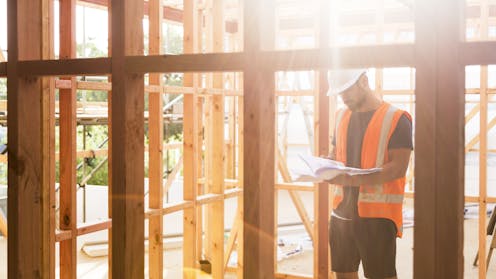how digital technology can make new liability rules watertight
- Written by Dat Tien Doan, Senior Lecturer, School of Future Environments, Auckland University of Technology

The government’s proposed shake-up of New Zealand’s building consent system will be the biggest reform in the sector since 2004. Essentially, the changes will spread liability for building failures across all involved parties, reducing the potential risk faced by councils granting those consents.
At present, homeowners can claim the full cost of repairs from any one party, but councils often end up paying when builders collapse financially. Under the new model, each party will pay only for its share of the problem.
In theory, this will speed up the consenting process because councils will be less risk averse, meaning construction activity in general will be freed from bottlenecks. In practice, however, a crucial question remains: how will homeowners be protected if things go wrong?
Part of the answer lies in other proposals contained in the reform package, such as mandatory home warranties and professional indemnity insurance, similar to schemes in Australia and the United Kingdom.
Consolidation of the country’s 67 building consent authorities, which often interpret the Building Act and Building Code differently, is also being considered.
But when it comes to failures in building design and construction, the devil is always in the detail – and in New Zealand it is often still contained in unreliable paper trails. As the leaky homes crisis showed, if accountability is also not watertight the costs can be enormous.
A comprehensive, reliable and accessible record of the entire consent process is needed to trace and assign liability. The proposed reforms are therefore about more than just simplifying things. They are a chance to modernise the entire system through digital accountability.
Closing the accountability gap
Think of the consent-and-build record as a secure digital logbook. Every inspection, approval and change can be time-stamped and stored to create a clear record of who did what, and when.
For homeowners, that means being able to check years later who signed off their foundations, for example. The UK already does this through its “golden thread” requirement for higher-risk buildings. This ensures information is digital, up to date and accessible throughout a building’s life.
Digital tools can also improve efficiency in three main ways:
Digital “twins” and 3D models create virtual versions of a building. Approvals can be embedded directly into the design, so compliance is visible from the start. The UK’s building information modelling framework shows how digital information can be managed consistently across projects.
Online national portals would replace New Zealand’s patchwork of separate council systems, which often cause delays and inconsistencies. A single secure entry point would let builders submit and track applications in one place. Singapore’s regulatory approval process for building works, CORENET X, already shows how this works in practice.
Remote inspections use video calls, photos or drones instead of requiring inspectors to visit in person. This can shorten approval times and reduce bottlenecks. The Ministry of Business, Innovation and Employment already provides guidance on remote inspections.
The integration of digital tools in building approval systems, as shown in the UK and Singapore, makes construction more transparent and efficient. By contrast, New Zealand still relies heavily on paper-based trails and inconsistent council practices.
Restore trust and improve productivity
The proposed reforms should make the consent process fairer and more efficient. But without digital accountability, the risk remains that home or building owners still end up bearing the costs when things go wrong and blame can’t be clearly assigned.
For the reforms to succeed, these three steps will be vital:
mandatory digital record-keeping for all approvals and inspections
integration of design, approval and compliance data on shared national platforms
and clear standards for data storage and homeowner access, ensuring records remain usable for decades.
Without these safeguards, proportionate liability risks leaving homeowners in limbo. With them, New Zealand can finally build a system that is fair, fast and future-proof.
The changes being signalled are an opportunity to seize the moment and properly digitise the system. This would protect homeowners, restore trust and help close the productivity gap that has dogged the construction sector for decades.
Handled well, the reforms could turn the consent system from a bottleneck into a platform for transparency and innovation. But digital accountability can’t be treated as an afterthought, it must be built into the system from the very beginning.
Authors: Dat Tien Doan, Senior Lecturer, School of Future Environments, Auckland University of Technology



















